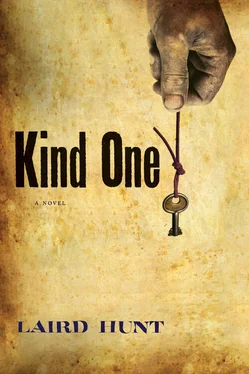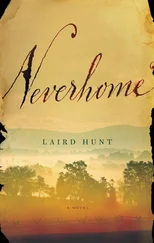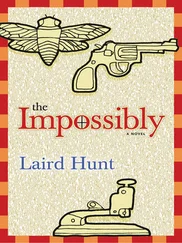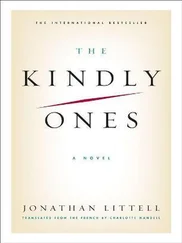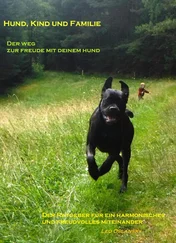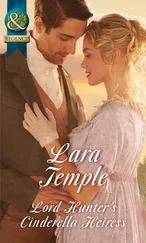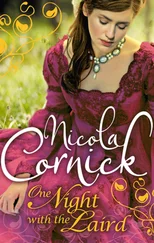In another way Alcofibras told it, the woman never got to leave that place. She just cried and cried until everything wet in her had fallen into that dough and the dough drank it all and she just shriveled up and fell into pieces on the floor.
You hear something like that and it walks out the door with you. It follows you out the door to your work or your rest then jumps into your head and runs around inside it like a spider. You think there isn’t much to a story like that and you think you’ve forgotten it, and a week later it is there. A year later it is there. Half a whole lifetime later it is there. Something like that gets in you and gets started and it doesn’t stop. Alcofibras said his grandmother, who came over to this country with iron on her ankles like the iron you could find in Linus Lancaster’s shed, could tell a story would put a nail through your foot. I had my stories from the grandson but didn’t walk any better after them for that.
Last night I dreamed up I was sitting on a chair out in what’s left of Lucious Wilson’s barley field they’ve just harvested and didn’t know what I was doing there and was about to holler out for one of the younger ones I used to tell Rumpelstiltskin stories to to come and harvest me out of there, when I tried to move my foot and couldn’t and knew help or not this wasn’t the running dream and I wasn’t going anywhere.
“Come on out now, Alcofibras,” I said.
“Taking my time, just like you,” came his answer.
I could see him. Just as young and dark and fresh as he was when he was still drawing his breath.
Linus Lancaster did not like for Alcofibras to tell his stories to us, but that is not why he got taken to his end. It was one week not long after I’d been named mother to the brood, and Linus Lancaster had brought Horace and Ulysses on the two-day ride to the big town to sell off some of the pigs he’d set loose and had the devil’s time herding up. He’d planned on just bringing Ulysses with him, but the pigs had turned ornery with their freedom and wouldn’t walk straight without sufficient encouraging, so Linus Lancaster took Horace away with him too. That very same evening we had a visitor, and when Alcofibras came back on ahead of him down the lane he passed me and Cleome and Zinnia and said, “That’s the Draper Man come to call.” And when all three of us had cried out, he said, without slowing his step, “Not tonight, and ain’t for you, that’s the Draper Man for me.”
The Draper Man was one of Alcofibras’s stories about the man who comes to measure for the drapes, then has you step out the door with him to cut the cloth he will wrap you up in, then carries you off to your end. The man who came up the lane behind Alcofibras had on a top hat and purple britches. There were two of his help with him. I had Alcofibras take the help out to the barn and went inside the house with Mr. Bennett Marsden, as he said his name was, who was a friend of Linus Lancaster’s from his days in Louisville when he had liked to sing on the stage. I had Zinnia, whom I had struck across the face that morning with the heavy spoon, see to supper, and I had Cleome, whom I had slapped across the back that afternoon with a switch of pig hide, fetch a bottle. They went to their jobs without any word to Bennett Marsden, who sat in Linus Lancaster’s chair at the table and looked at them and said they had done grown up and transformed themselves into fillies.
“That Alcofibras ain’t any more giant or any less ugly than he was, though,” Bennett Marsden said when he had his soup and whiskey. “He still tell all those stories?”
“Have you heard Alcofibras’s stories?”
“Tell you what, I’d like to hear another.”
I sent the girls away and called for Alcofibras to come and stand by the table and tell a story to our guest. Alcofibras came in holding a potato in one hand and an onion in the other.
“Put those things outside and tell Mr. Bennett Marsden a story. He has asked for one,” I said.
Alcofibras was quiet a long minute. He had a way of being quiet that cooked at your patience. I was fixing to correct him on it and for not taking the vegetables outside when his eyes flicked up at Bennett Marsden and he asked if he wanted to hear the story of the potato or the onion.
“Both,” said Bennett Marsden with a laugh.
Alcofibras did not laugh, just let his eyes drop and went back into his quiet and stood there.
“Onion, then,” said Bennett Marsden.
“He called for both,” I said.
“Onion,” said Alcofibras. He tossed the potato out into the yard and held up the onion. Then he went to the counter in the corner and took up the big knife sitting there and cut off its skin. When the onion was skinned he lifted it up and gave it a good sniff. There was some flour and bacon fat and corn pone and chopped apple and stewed oyster at the ready for Zinnia’s cooking. Alcofibras took a little of each of these and set them in a line on the counter. Then he picked up the onion and turned to us again.
“The onion slept with a cord attached to its ankle in the coal cellar unless the coal cellar already had company and then he slept with a cord attached to his ankle in the yard. In the coal cellar the coal spoke to him, and in the yard it was the trees. One night the master came home with his face painted for the stage. The master lay about him until everything he struck had fallen. One did not rise and never would again, and when the master woke from his rage he wept, and before he had finished weeping the onion was gone. The oyster shell he had cut his cord with he kept along with a piece of bacon, a pocketful of flour, two apples, and a hunk of pone. He ran through the streets. His onion legs grew tired, so he took a bite of pone and made them strong. His onion arms and chest grew tired, so he took the oyster shell and cut the air in front of him and continued on. The city stretched before him. He ran toward the rising sun. A woman fetching water asked him why he was running, so he took a bite of one apple and turned her into an apple tree. Her child started to cry, so he took another bite and turned it into a buzzing bee.
“The onion ran and he ran. Near the outskirts a group of men set against him, so he broke off bits of the bacon and turned them into pigs. The pigs set into chasing after him, so he turned and cut at them with his shell. When they were killed he lit a fire and set a pot to boil and hung them over it and scraped them one by one. Then he butchered them and set some of them on skewers and caught their fat in a cup. He could hear barking, so he took off the cooled fat and carved it into a woman, and when he took a bite of his pone that woman blinked her eyes open and off together they ran.
“They ran but she was new to running and fell behind, so he turned her into a twig and put her in his pocket. The dogs came running after them, so he took some of the flour and flung it into the air and the air began to burn. The dogs ran through the fire and men came after them. They came and they came, so he flung more flour into the air and the air filled with water and the dogs drowned.
“When the dogs had drowned he took the twig out of his pocket and turned it back into his wife. They lay together on the mosses. They scratched their backs and fronts against the bark. They floated above the leaves. They had barely finished when his wife said, ‘Here come some men.’ The men carried torches. The onion took a bite of his other apple and the earth split asunder. The heavens raged and its powder kegs roared and a cataclysm ensued. The earth turned to water and the water to earth. Ice smashed at the trees. Time burned. There was a howl in the throat of the winds. Still the men came. He turned his wife into a stone and put her back in his pocket. He turned himself into a ball and went rolling and bouncing through the wood. It was dark, but the onion could see his way by the light of the torches behind him. Ever closer and ever brighter. The trees around him grew taller. They spoke to him. A door opened in one of them and he went into it.
Читать дальше
